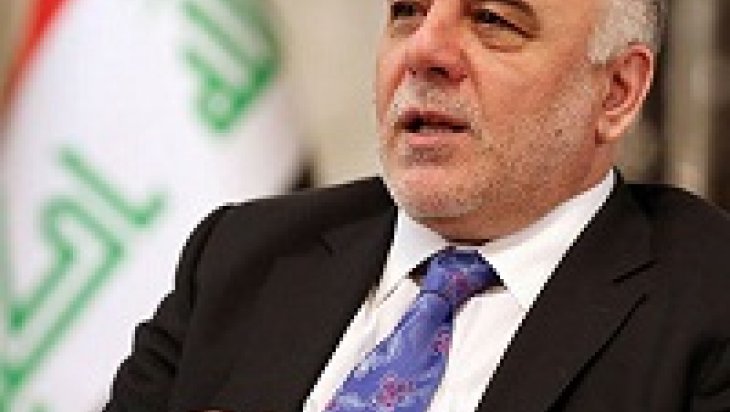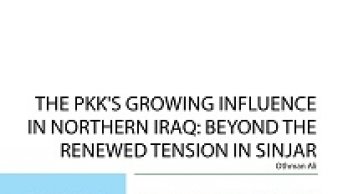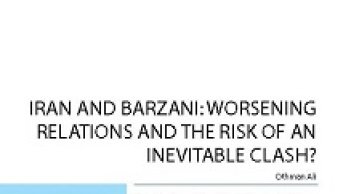Who is pushing al-Abadi out of the power:The Iranians or the Americans and why?

During the last two weeks, the calls for reform in Iraq began to be more intensified and louder than ever for several reasons. Firstly, the Shiite Marjaya in Iraq,represented by Ayatollah Ali Sistani, who was instrumental in bringing him to power, withdrew its support on the ground that his government failed to deliver on reforms. Secondly, the powerful Muqtada al-Sadr, a young cleric with widespread support, called on his followers to march on the Green zone to topple the government. On Friday 4th March, tens of thousandsof Iraqis marched on the Green Zone and demonstrators had one demand: “Down with the corrupt government! We want a clean and efficient technocratic government”. Al-Sadr said he has withdrawn his support for the coalition government which al-Abadi has formed in 2014, and threatened to escalate the protest movement until he sees the government resigns. To make his promise good, he and thousands of his followers fortified their presence in the Green Zone. This made the situation very critical in Iraq and there are rumors in Baghdad about several ominous scenarios including an intra-Shiite fighting among the heavily armed groups and the possibility of a military coup by officers loyal to Nouri al- Maliki Dawa party, the Prime minister (2006-2014). In fact, al-Maliki group threatened that unless Sadr’s militias withdraw from Baghdad, they will be forced to order their armed followers to confront them. At the end, this chain of events forced the Prime Minister Abadi to announce a new cabinet, which is waiting for approval.
Before al- Sadr intensified his recent opposition to the government there were already ongoing peaceful rallies every Friday by a group called al-Hirak Almadani which wants to end what they consider sectarian, corrupt, and clergy-based government and establish a civil government. Sadr has stated recently that he is siding with the on-going protests and called all Iraqis to join the protest movement. This has the potential to grow and pose a serious threat to al-Abadi government.
Al-Abadi is facing challenges from all groups and many people think that he is not up to the task of leading Iraq out of these multifaceted and critical national crisis. Both Sunni coalition of the Iraqi National Forces Alliance and Kurdistan Alliance stressed that they would not accept any change in the government if they were not to be consulted. Both groups have concerns that the Shiite Iraqi Alliance is trying to exclude them from power in the pretext of forming of a government which is not bound by sectarian and ethnic representation. Therefore, al-Abadi is not in an enviable position. The question which needs to be answered here which of the two powerful players in Iraq is trying to pull the rug from underthe feet of al-Abadi: the Iranians or the Americans and why?
As the power of the Islamic state of Iraq and Levant (ISIL) wanes, the rivalry for control and influence between US and Iran over post ISIL-Iraq intensifies. This rivalry is beginning to manifest itself in the apparent struggle for power between two rival camps within the Iraqi Shiites political spectrum: the followers of Nouri-al Maliki, who is backed by Iran, and Haider al-Abadi, who is backed by USA. It appears that the conflict between the two camps has been brewing below the surface for some times, but the dictates of ISIL threat in Iraq has prevented it from coming to surface.
Both al-Abadi and al-Maliki belong to the Islamic Dawah party which was established in the late 1960s. Although Mr. al-Maliki and Mr. al-Abadi come from the same Islamist movement, they have quite different backgrounds. Mr. Maliki grew up in a village in rural region of southern Iraq, spent his time in exile in Syria and Iran, speaks no foreign languages and is deeply hostile and suspicious of the West. Mr. Abadi is considered more urban and sophisticated. The American diplomats who have worked with al-Abadi have a positive view about him too. However, he has many challenges in ruling Iraq; the foremost of these challenges is al-Abadi's personality, which is indecisive, and the Dawa Party's heavy authoritarian and sectarian legacy.
Iranian and US perspectives on al-Abadi:
Al- Abadi has been always a strong advocate of working closely with the US administration. This is in contrast to al-Maliki,who tried to eradicate any direct US presence in Iraq during his negotiation and signing of the "Status of the Forces" agreement with US in 2008. Al-Abadi thinks that renewed U.S. action in Iraq would make the Iraqi government less reliant on military support from Iran. Iranians had initially been opposed to accept him as a replacement to al-Maliki. Their acceptance came only after Sistani's insistence that al-Maliki was considered to be no longer fit to rule Iraq.
Al-Abadi is resentful of Iranian tutelage in Iraq. He does not seem to be on cordial relations with General Qassem Suleimani, of the Iranian Revolutionary Guard – Quds Brigade.
The support of al- Marjaiya for al-Abadi is the only real asset he has in his struggle with his powerful foes,especially al-Maliki , who has the support of Iranian backed 70,000 strong Hashd al-Shabi (the Popular Mobilization Units-PMU). Sistani is also in conflict with Iranian regime and Qum-based clerks who are proponents of the velayetal-Feqih as represented by Ayatollah Ali Khamenei of Iran.
In addition, Iran's heavy-handed policy in Iraq seems to have alienated many Shiite groups. For example, the “Da’wa” party, the Supreme Council of Iraq, and the Sadr movement have experienced internal divisions due to Iranian manipulations.
Recently Iran has become worried about the growing relations between al-Abadi's government and the United States. Al-Abadi government, with the encouragement of US, is trying to establish a government of technocrats to introduce major reforms. The pro-Iranian circles see this as an attempt to undermine PMU and them. Al-Abadi government has kept PMU out of battles in the Sunni regions of Ramadi and intends to do the same in the ensuing battle for Mosul. Instead, the Iranians are working with al-Maliki and Hadi al-Ameri, the head of the PMU, which risked undermining the government's reform program. In many occasions, statements coming from Sistani's office were seen by many as a protest against Iran's backing of al-Maliki and PMU leaders' attempt to block reform.
Unless the US government pursues a more active posture in Iraq to stop al-Maliki's efforts to stage a comeback in Baghdad, al- Abadibe faced difficulties in running the country. The challenges he has been confronting since the announcement of the new cabinet is yet another testimony to how difficult it will be to introduce reforms in the already over-complicated political structure in Iraq.







